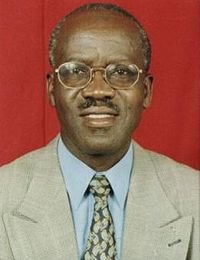Timothy Wangusa's A Taxi Driver On His Death is arguably one of the finest poems to have come out from Africa.
Published in 1994 as part of a collection of poems named A Pattern of Dust, A Taxi Driver On His Death is an interestingly unusual poem in which the narrator, a taxi driver, predicts his own death.
He foresees that his death will result from an involvement in a ghastly road accident that is unfortunately unavoidable. Although death is an inevitable aspect of human life and no one knows exactly when the final hour will come, the narrator in this poem seems to know not only when his death will come but how it will come.
The philosophical poem opens with the puzzling lines:
When with prophetic eye I peer into the future
I see that I shall perish upon this road
Driving men that I do not know.
The narrator goes on to tell us what exactly will result to his death. The predicts that his taxi, which has done his bidding (including breaking the speed limits) throughout the years, will result to his death.
This metallic monster that now I dictate,
This docile elaborate horse,
That in silence seems to simmer and strain,
Shall surely revolt some tempting day.
Unfortunately, the narrator explains that on the evil day he will break the speed limits not because he wants to make the proprietor's gain, nor heed to the calls of hasty passengers nor even for his personal gain.
Somehow, the narrator suggests that the evil day will come only because it has been destined to come. Unfortunately, there seems to be nothing that can be done to avert it.
Thus I shall die; not that I care
For any man’s journey,
Nor for proprietor’s gain,
Nor yet for love of my own.
Not for these do I attempt the forbidden limits,
For these defy the traffic-man and the cold cell,
Risking everything for the little, little more.
Finally the narrator predicts the reactions of would-be onlookers to his violent death. He believes that they will show him some pity, but only for a while, before hastily dismissing his death as the usual fate that befalls taxi drivers. Hear the lines:
They shall say, I know, who pick up my bones,
“Poor chap, another victim to the ruthless machine”—
Concealing my blood under the metal.
About the Author
Born in 1942, Timothy Wangusa was a Ugandan poet and novelist. He studied English at Makerere University before travelling to the United Kingdom for this post graduate studies.

Image Source
He is the author of the novel Upon this Mountain (1989) and several other collection of poems. He had a successful academic career before taking up the job of a Senior Presidential Advisor In Museveni's government in his home country of Uganda.
- FURTHER READING
Wikipedia
Observer.ug

Source
Copying and pasting previous posts or significant parts of it of could be seen as spam when:
Spam is discouraged by the community and may result in the account being Blacklisted.
Please refrain from copying and pasting previous posts going forward. If you believe this comment is in error, please contact us in #appeals in Discord.
Very well written specially those line saying : "Thus I shall die : not that I care Nor for proprietary's gain" that is out of the world. Outstanding 👏👏
Thanks for sharing your thoughts. I love those lines too.